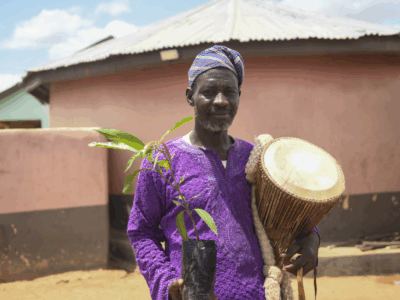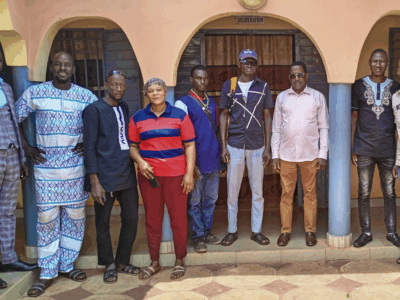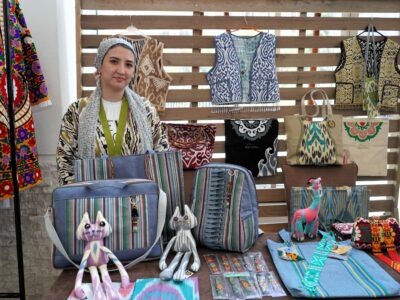The Gbehlay Geh Rural Women Farmers’ Multipurpose Cooperative Society (GRWFMCS) is a women-managed cooperative in east-central Liberia. The cooperative has 86 members, 81 of whom are women. Their members cultivate a variety of crops including vegetables, legumes, and rice. GRWFMCS manages a number of small enterprises including a rice milling facility, an oil palm mill, and recently established a micro-financing institution.
For years, GRWFMCS farmers had been using traditional produce storage methods and, in the case of cowpeas and other legumes, farmers reused polyethylene-lined bags placed within woven polypropylene sacks. Because the bags were reused, they were often damaged, allowing both oxygen and cowpea weevils to enter and remain in the lining of the bags, re-infecting produce each season. The infestations grew rapidly and almost caused GRWFMCS to lose their stored crop completely. Most of the cooperative’s women did not know what was damaging their legumes. When Farmer-to-Farmer (F2F) field staff visited the women’s farming co-operative in early 2014, GRWFMCS requested technical assistance through the F2F program staff in Liberia.

Plant Pathology PhD Student Leads Pest Control Training for 32 Farmers in Liberia
In June 2014, F2F volunteer Ms. Carrie Teiken, a University of California Davis PhD student in plant pathology and former Ghana Peace Corps volunteer, led a two-week training course on Beans Bug Management and Warehouse Storage in Karnplay, Nimba County, Liberia. Thirty-two GRWFMCS farmers, 27 of whom were women, attended the training and learned new storage mechanisms and post-harvest handling techniques to reduce cowpea weevil infestations. Teiken demonstrated the importance and use of airtight steel drums or Purdue Improved Cowpea Storage (PICS) bags. She advised the farmers to harvest their pods as soon as they mature and to immediately dry them after harvest to reduce weevil infestations. She also taught them that seeds should be exposed to a solar heat prior to drying to kill any weevils and eggs that come from the field. Her specifications noted that cowpeas should be properly dried to 10 percent moisture content before storage and should not be stored for more than six months.
At the end of the training, Teiken encouraged farmers to begin practicing integrated pest management field practices, such as crop rotation; field sanitation prior to planting; adding compost to improve plant nutrient content and soil structure; insect trapping and disease monitoring; the application of organic pesticides such as neem oil (derivative of a plant which drives away insects), soap, and/or garlic; weeding twice per growing season; and planting in rows instead of scattering the seeds on the ground.
Since Teiken’s training, GRWFMCS farmers have put her recommendations into practice and reported a 20 percent reduction in cowpea post-harvest losses from last season, effectively increasing farmers’ earnings and boosting crop yields for the local Liberian markets. “[Teiken’s] training really helped us” said Annie Kruah, the chairlady of the cooperative. “We are now getting profit from our cowpea farms.” Thanks to Teiken’s introduction of preservation techniques, there has been a 22 percent increase in co-op members growing cowpeas, and a third of the existing cowpea farmers have increased their cultivation areas from three to five acres. Thanks to Teiken and the training she provided, these women are now sharing this knowledge with other farmers in the community and new members of GRWFMCS.
Learn more about our work in Liberia.
Read this article as it was featured in the Feed the Future newsletter, August 2015.








